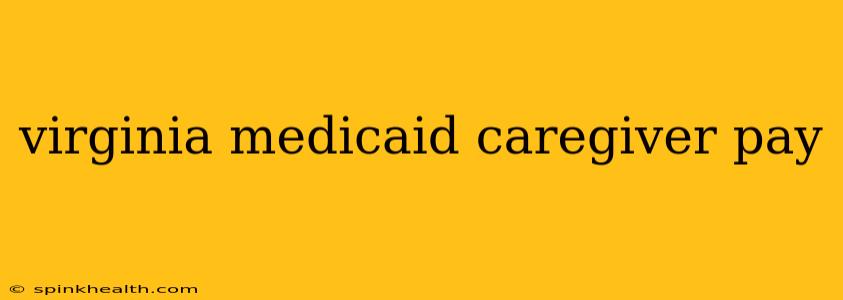Navigating the world of Medicaid caregiver pay in Virginia can feel like traversing a labyrinth. The rules, regulations, and eligibility requirements can seem daunting, leaving many caregivers unsure where to even begin. This comprehensive guide aims to shed light on this often-confusing topic, helping you understand the intricacies of compensation for caring for loved ones through the Virginia Medicaid program.
Our journey begins with a tale of Sarah, a devoted daughter who cares for her aging mother, Martha. Martha suffers from Alzheimer's disease and requires around-the-clock assistance. Sarah, a former teacher, left her job to become Martha's primary caregiver, a decision born of love but also one fraught with financial challenges. Like many caregivers, Sarah wondered: Can Medicaid help with caregiver pay? This is the question we will answer, exploring the different programs and pathways available.
What is the Virginia Medicaid program, and what does it cover?
The Virginia Medicaid program is a government-funded healthcare system providing medical assistance to low-income individuals and families. While Medicaid itself doesn't directly pay family caregivers for their services, it does offer several programs that can indirectly support caregivers or provide financial assistance that allows them to continue caring for their loved ones.
Can I get paid for caring for a family member through Medicaid?
No, Medicaid doesn't directly pay family members for providing care. This is a crucial point to understand. However, it does offer options that can alleviate some financial burdens faced by caregivers. These options often involve exploring other programs and utilizing available resources to support both the care recipient and the caregiver.
How can Virginia Medicaid support caregivers financially?
While direct caregiver pay isn't offered, several avenues can indirectly assist caregivers:
1. In-Home Services:
Medicaid's in-home services program helps individuals remain in their homes by providing assistance with daily living activities. This can include personal care, bathing, dressing, meal preparation, and light housekeeping. These services are not paid to family members, but they lessen the caregiver's burden, freeing up time and potentially reducing the need for them to forgo income.
2. Respite Care:
Respite care provides temporary relief for caregivers. Medicaid may cover short-term stays in adult day care centers or provide funding for temporary in-home help, giving caregivers a much-needed break. This can be invaluable in preventing burnout and maintaining the caregiver's physical and mental health.
3. Personal Care Attendants:
For individuals needing more intensive care, Medicaid may cover the services of a personal care attendant. These attendants are hired professionally and provide care under a specific plan. While the caregiver isn't paid directly, having a personal care attendant reduces the burden and allows family members to focus on other responsibilities.
4. Waiver Programs:
Virginia offers various Medicaid waiver programs designed to support individuals with specific needs in the community. These waivers may include funding for in-home services, equipment, and other support systems, which can reduce a caregiver's financial strain.
5. Supportive Housing:
Medicaid may assist with finding and paying for supportive housing options that provide assistance with daily living and health needs. This could reduce or eliminate the need for around-the-clock care at home.
What are the eligibility requirements for Virginia Medicaid caregiver support?
Eligibility for Medicaid-funded support services depends on several factors, including:
- Income: The care recipient's income must fall below specific limits.
- Resources: The care recipient's assets must also be below certain thresholds.
- Need for Care: The recipient must require a significant level of assistance with daily living activities.
To determine eligibility, it's crucial to contact the Virginia Department of Medical Assistance Services (DMAS). They can provide guidance and assist with the application process.
How do I apply for Virginia Medicaid caregiver support?
The application process varies depending on the specific service or program. Contacting the DMAS is the first step. They can help determine the appropriate program and guide you through the application process. This often includes providing documentation like proof of income and medical records.
Sarah, after navigating the complex system with the help of DMAS and several social workers, secured Medicaid coverage for in-home assistance and respite care. While she doesn't receive direct pay, the relief provided by these programs allows her to continue caring for her mother while maintaining a degree of her own well-being. Her story highlights that while direct caregiver pay may not be available, Virginia Medicaid provides a safety net of support for both the care recipient and the caregiver. The key is understanding the available resources and actively engaging with the DMAS to access them.

